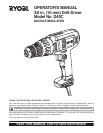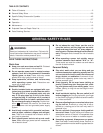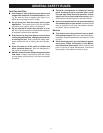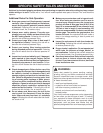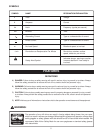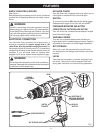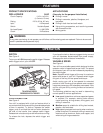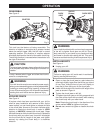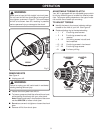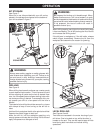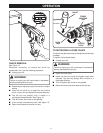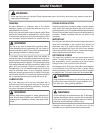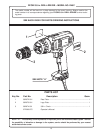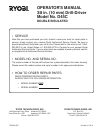
7
®
20
24
5
0
-
1
0
L
F
A
0
-
3
/
8
FEATURES
PRODUCT SPECIFICATIONS:
DRILL-DRIVER D45C
Chuck Capacity 1/16 in. to 3/8 in.
(1.6 mm to 10 mm)
Rating 120 V, 60 Hz, AC only
Input 4.5 Amperes
Switch Variable Speed
No Load Speed 0-1000 RPM
Clutch 24 Positions
APPLICATIONS
(Use only for the purpose listed below)
■ Drilling in wood.
■ Drilling in ceramics, plastics, fiberglass, and
laminates.
■ Drilling in both hard and soft metals.
■ Using driving accessories, such as driving screws
with screwdriver bits.
■ Mixing paints.
OPERATION
SWITCH
See Figure 2.
To turn your drill ON, depress the switch trigger. Release
switch trigger to turn your drill OFF.
LOCK-ON BUTTON
See Figure 2.
Your drill is equipped with a lock-on feature which is
convenient when continuous drilling for extended periods
of time is required. To lock-on, depress the switch
trigger, push in and hold the lock-on button located on
the side of the handle, then release switch trigger.
Release lock-on button and your drill will continue running.
To release the lock, depress the switch trigger and
release.
If you have the lock-on feature engaged during use and
your drill becomes disconnected from power supply,
disengage the lock-on feature immediately.
VARIABLE SPEED
See Figure 2.
Your drill has a variable speed switch designed to allow
operator control of speed and torque limits. The speed
and torque of your drill can be increased by depressing
the switch trigger.
Note: Depress switch trigger all the way for maximum
speed and torque of your drill. Depress switch trigger
only part of the way for less speed and torque.
Avoid running your drill at low speeds for extended
periods of time. Running at low speeds under constant
usage may cause your drill to become overheated. If this
occurs, cool your drill by running it without a load and at
full speed.
The following guidelines may be used in determining
correct speed for various applications:
■ Low speed is ideal when minimum speed and power
is required. For example, starting holes without
center punching, driving screws, mixing paint, and
drilling in ceramics.
■ Medium speed is suitable for drilling hard metals,
plastics, and laminates.
■ High speed produces best results when maximum
power is required. For example, drilling in wood; soft
metals such as aluminum, brass, and copper, and
when using driving accessories.
WARNING:
If any parts are missing, do not operate your drill-driver until the missing parts are replaced. Failure to do so could
result in possible serious personal injury.
FORWARD/REVERSE
SELECTOR
SWITCH
TRIGGER
LOCK-ON
BUTTON
TO INCREASE SPEED,
DEPRESS SWITCH TRIGGER
Fig. 2



